The content of the article
Chicken droppings are a worthy substitute for chemical fertilizers for vegetables and fruit trees. Organic nutrition contains nitrogenous compounds with potassium and phosphorus, as well as calcium, which accelerates the growth of tomatoes, strawberries, cucumbers and other garden crops. Bird excrement is more nutritious than mullein, but has one drawback. Litter is a concentrated fertilizer that can burn plants, so the proportions should be observed when preparing recharge.
Fresh excrement option
A liquid organic solution is added to the soil in the spring before planting seedlings and seeds. It contributes to the formation of a strong root system and increases productivity. Do not fertilize the beds with chicken excrement during the ripening period, so as not to become infected with E. coli and helminths.
You will need a large plastic or iron barrel, in which they mix:
- bird droppings;
- settling water.
Take the fertilizer components in equal proportions. Work with organics with gloves and a gauze bandage, which will protect against the unpleasant odor from the workpiece. With a wooden stick, carefully stir the chicken droppings with water to get a homogeneous mass, and cover the barrel with boards or a large lid.
It is advisable to put the container with fertilizer in a shaded place. The sun accelerates fermentation, and the mixture of excrement becomes too concentrated and saturated, stored only 1-2 months. Keep the barrel under a tree or street canopy, where it is warm and has good ventilation.
After 2 weeks, fresh chicken manure recharge will be ready. Before applying fertilizer to the ground, it is diluted with water. For 1 liter of fermented excrement, 10 to 50 liters of liquid will be needed. A more concentrated solution is suitable for fertilizing trees, as well as some shrubs. Weak feeding is intended for garden crops.
Pour the solution 5-10 cm from the root system or beds. In direct contact with the plant, bird droppings can burn soft tissues, and the culture will burn and wither. Under an adult tree make about 10 liters of water, and 3-5 liters are enough for seedlings and bushes.
Fertilize crops preferably after rain or heavy water with plain water. Moist soil better absorbs chicken droppings and protects the root system from burns.
The finished product from bird excrement is stored until the end of autumn. The concentrated solution will not deteriorate even from the heat, but it should be hidden from direct sunlight.
Tip: You can remove the characteristic smell of litter with copper sulfate. The product is added to the solution before infusion. On a barrel you will need 250-300 g of a chemical additive.
Granular fertilizer
Summer residents who do not tolerate the smell of fresh litter in specialized stores can purchase a dry version. Granular excrement is odorless, stored for 2-3 years and contains as many useful components as home organics.
Together with a dry additive, peat is bought, with which crushed litter is mixed. The mass is poured into wooden or plastic boxes with holes. The workpiece is placed in a warm ventilated room, where it is stored until the beginning of garden work. Peat mass is added to the wells before planting potatoes or seedlings to increase productivity.
Bird excrement compost
Chicken droppings rotted with straw or sawdust fertilize the soil before plowing the land.Experienced farmers prefer to use the mixture in the fall, so that by spring the rest of the recharge is absorbed into the soil. But compost from bird excrement is sprinkled on the ground in March or early April, a few weeks before planting garden crops. Distribute a thin layer over the site, and then dig it up manually or with a tractor.
To prepare nutritious compost, you should pour it into a special hole:
- a layer of bird excrement 20–25 cm thick;
- straw - 5-10 cm;
- as much or slightly less sawdust;
- top cover the workpiece with a layer of peat 10–20 cm high.
Put a thick film on the compost pit to accelerate the maturation of the workpiece and prevent the spread of unpleasant odor throughout the area. If the pile is higher than 1 m, the temperature in the lower layers reaches + 65–70 degrees, at which the components do not fade, but “burn”. Owners of large gardens should be equipped with several collars 3.5–4 m wide and 2–2.5 deep. The length of the pit is arbitrary.
Compost will ripen in 1.5–2 months. In addition to straw and peat, the following is added to the harvest:
- weeds
- tree bark and dry branches;
- food waste, but no chemicals like detergent or plastic bags;
- fallen leaves;
- wood shavings.
Compost is enriched with mineral and organic additives:
- powdered superphosphate;
- wood ash;
- potassium salt;
- phosphate flour;
- ammonium nitrate;
- medicinal herbs like St. John's wort or chamomile.
Fertilizer will become thicker if you put a layer of turf or sheet earth, or clay. Add chopped corn stigmas, beet tops, rotten fruits or leftovers to chicken droppings.
The bottom of the compost pit is covered with branches or dry straw, which performs a drainage function. After 1.5–2 weeks after laying the last layer, when the temperature in the pit drops to + 35–30 degrees, the components are mixed with a shovel. The procedure ensures uniform decomposition and maturation of all layers. Ready compost turns out to be dry and crumbly, it smells of damp earth or wood, if it included wood shavings.
Litter fertilizer
Owners of chicken coops will like the option of straw and bird droppings. They start preparing recharge in the spring, in order to be in time for the fall. The process is simple and does not take much time. The chicken coop is cleaned of old excrement, after a layer of straw, sawdust or peat is laid on the floor. Choose any litter that is cheaper.
When the first layer becomes dirty, lay the second, and then the third. Litter 50-60 cm high is separated from the floor and taken out to the garden or garden. A blank of chicken droppings is spread on the ground with a thin layer and left to lie. Avian excrement is absorbed into the soil by rain and snow, enriching it with nutrients. Straw or peat protects the root system of trees from frost.
Litter is also used during the growing season of shrubs and other garden crops. Straw mixed with dried droppings is spread on the ground and left for 3-4 days. When moisture evaporates from the workpiece, trees and fertilizer are abundantly watered from the hose.
The litter from the chicken coop can be transported into a compost pit so that it can be quail and become homogeneous. The resulting recharge is used when planting new trees. Bird excrement is combined with soil substrate or clay, poured into prepared holes and digged the ground. On 10 m2 you will need from 2 to 5 kg of decayed litter.
Emergency recharge
Two weeks too long? Urgently need organic fertilizer? Chicken droppings do not have to be infused for 14 days to bring to the correct concentration. A weak solution that does not harm plants is prepared from a bucket of filtered water and a handful of dried feces. For garden crops, a tablespoon is enough, because they are softer than trees and shrubs.
Stir litter in water so that it is completely dissolved.Leave for 30-40 minutes in a warm place, and then gently apply into the soil with a can or watering can. After fertilizing, it is advisable to water the soil abundantly with clean liquid without additives. Water dissolves the mineral components that make up chicken manure and protects the root system of the plant from burns and dying.
Special fertilizer
Not all plants like sour poultry manure. Some crops after such fertilizer absorb nutrients worse and weaken. For seedlings that prefer slightly acidic or neutral soil, it is recommended to prepare a solution of chicken excrement by soaking:
- Pour organic product into a bucket so that it occupies half the capacity.
- Fill the second part with water and mix thoroughly with droppings.
- Leave on for 2-3 days until the liquid becomes a shade of strong tea.
- Drain the water, you can fertilize it with an apple or pear. Add a new portion of liquid to the precipitate.
Repeat the procedure 3-4 times. The result is a light brown solution, which is diluted with a small amount of water and applied to the soil. Apply slightly acidic fertilizer during the growing season and the formation of fruits.
Homemade chicken droppings
Excrement is harvested in the summer in a well-lit area, flooded with sun. Spread a thick film or iron sheet. Put the litter in a thin layer and leave for several weeks, periodically turning and stirring. Be sure to protect from rain, otherwise nothing will work.
Sprinkle dried up excrement with decayed plant residues or wood shavings. The additive will slow the conversion of beneficial nitrogen to ammonia. Store dried manure in wooden boxes with ventilation holes.
Recommendations
- The sediment remaining at the bottom of the bucket is poured under an apple tree or any berry bush, like currants or raspberries. Concentrated feeding will not interfere with plants, but only increase productivity.
- Chicken droppings are not sprayed, but gently poured into the ground. If droplets of replenishment fall on the leaves of the plant or ovary, the product is thoroughly washed off with clean water, otherwise a burn will remain.
- A solution of the correct concentration has a hint of weak tea leaves. A little richer and seedlings wilted.
- To disinfect liquid chicken manure, 1-2 kg of wood ash is put in a barrel. The supplement destroys the eggs of most insects, but weed seeds and helminths remain in the feed.
- Feeding garden plants with bird excrement is carried out after rain or evening watering.
- Work with litter should be in rubber gloves, because chicken feces can contain not only helminths, but also salmonella.
- During the season spend from 2 to 4 top dressing. If organic fertilizer is applied more often, the green mass of plants will increase, but the yield will be small.
- Onions and garlic can not be fed during the period of active growth. The solution is applied to the soil during the growing season when the ovary is still absent.
Chicken droppings are a real find for fans of organic fertilizers. The supplement speeds up the ripening of the fruits and increases the yield, and its rich smell repels the bear. Solutions of bird excrement feed trees and garden crops, strawberries and even garden flowers. The main thing is to correctly calculate the proportions so as not to burn the plant, and remember that it is better to underfeed than to overdo it.
Video: how to fertilize with chicken droppings

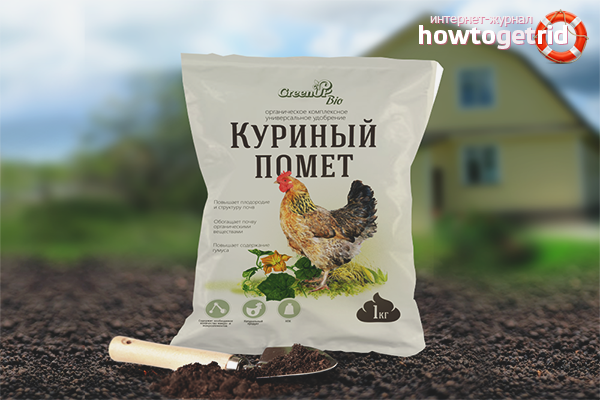
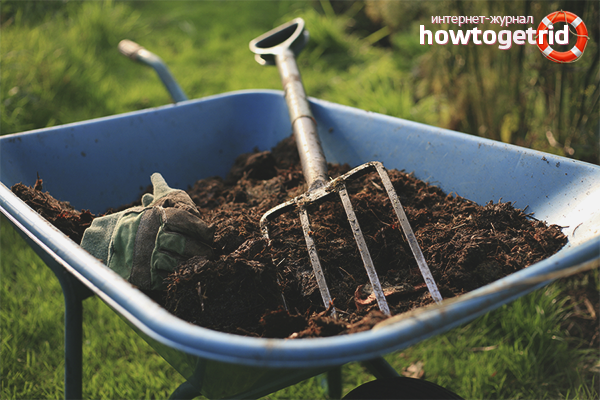
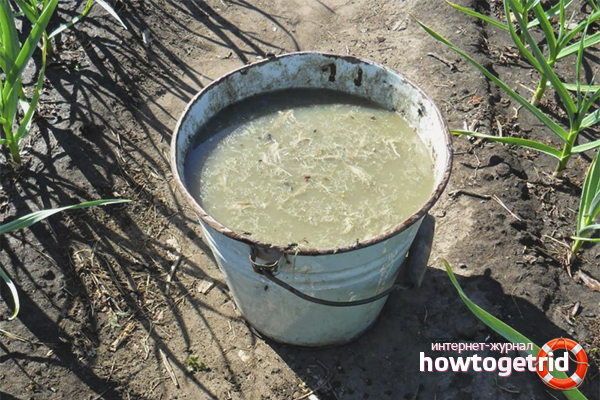
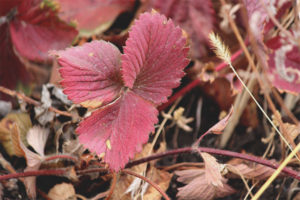
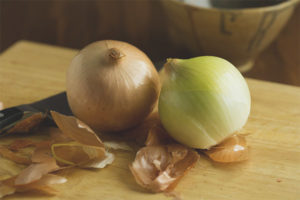
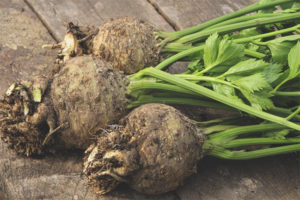
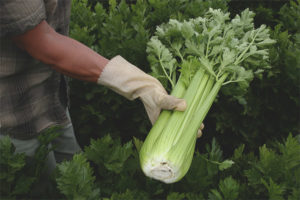
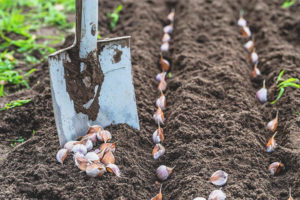
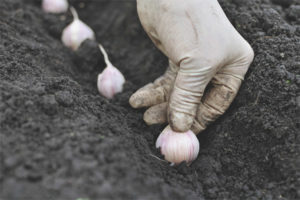
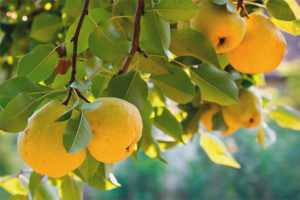
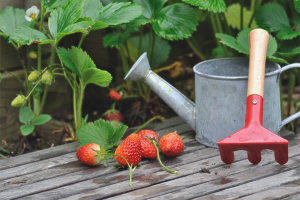
Submit